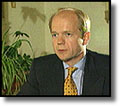
|
Devolution Bill Backed By CommonsThe Bill preparing the way for self-government for Scotland and Wales has cleared its first parliamentary hurdle.Conservative attempts to block the second reading of the Referendum Bill were crushed by 406 votes to 155, leaving the Government with a majority of 251. The Conservatives attempted to block the Bill saying that full details of the proposed Devolution Bill should be made clear to the people of Scotland and Wales before they are asked to vote in a referendum.
The current Bill, if it is passed, will give the people of Scotland the chance to vote for their own parliament in Edinburgh, with or without tax-varying powers, and the people of Wales the opportunity to endorse their own non-tax-raising Assembly in Cardiff. While the Bill seems certain to go ahead the government has done little to answer the many difficult questions posed by the immpending passage of the Bill, not least the new question issued by Tam Dalyell, the long standing Labour opponent of devolution and the framer of the West Lothian question. On Wednesday in his "Bury North question" Mr Dalyell asksed why a Scottish MP can be elected on a electorate of 55,000 while in England it would be 68,000. Further criticisms from the Conservatives centre around the issue that the Government will not publish its white paper on devolution until after the referendums have taken place. Leaving the electorate and Parliament in the dark as to the details involved in devolution. Further opposition to the Bill has come from both the Scottish and Welsh nationalsists who insist the Bill does not go far enough. In particular there have been calls from Plaid Cymru's Ieuan Wyn Jones who said "The people of Wales should at least be given the opportunity to vote on what is on offer in Scotland in terms of legislative and tax-varying powers." Meanwhile the Conservative MP Sir Teddy Taylor, who was Shadow Scottish Secretary at the time of the 1979 devolution referendum, argued there should be a threshold of at least 40% of the electorate supporting the plans before devolution could be accepted. He said it was such an important issue, it should not be allowed to be decided by a minority of the population. "It's going to create horrendous mistakes for the Government, it's going to create unfortunately confusion, it's going to also, I'm afraid, simply create further pressure for separation." The Bill's second reading was approved without a vote. The measure will be brought back to the floor of the Commons for detailed discussion in its committee stage in two weeks time and the referendums are expected to take place in September. Welsh Secretary Ron Davies said, while winding up the debate for the Governement, said that the Bill would allow, "diversity and hand more power to Scotland and Wales." |
Diana, Princess of Wales, 1961-1997
Conference 97
Devolution
The Archive
News |
Issues |
Background |
Parties |
Analysis |
TV/Radio/Web
Interactive |
Forum |
Live |
About This Site
News |
Issues |
Background |
Parties |
Analysis |
TV/Radio/Web
Interactive |
Forum |
Live |
About This Site
© BBC 1997 |
politics97@bbc.co.uk |

